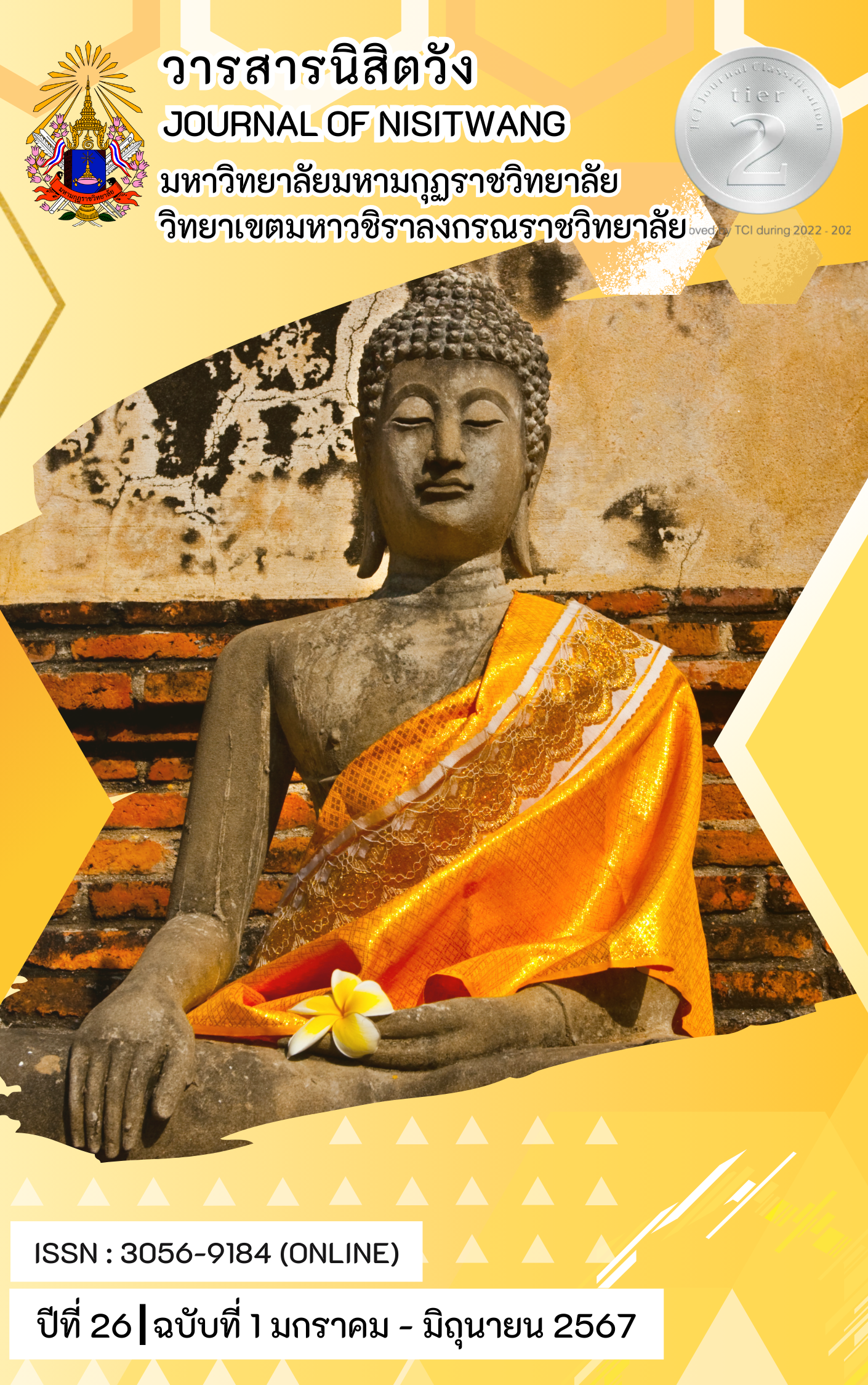THE DIGITAL LEADERSHIP of EDUCATIONAL INSTITUTION ADMINISTRATORS
Main Article Content
Abstract
This article aims to study the digital leadership of educational administrators in the digital era by examining academic documents, articles, textbooks, and academic journals. The study reveals that rapid changes in the digital era significantly impact behavior in life and learning. The world of learning has swiftly changed by internet systems, and the development of digital technology which online knowledge networks have been visibly propelled. Educational administrators must possess the ability to lead organizations to be contemporary and responsive to the current global landscape. They need to learn how to effectively initiate changes in the education system within their organizations, ensuring efficiency from both external and internal perspectives. Moreover, change presents new opportunities for organizational management, aiming for maximum benefits and sustainable development. Educational leaders must be knowledgeable in various aspects, including having a vision, creating a digital learning culture, professional excellence, systematic improvement, and being responsible citizens in the digital age, as well as creating inspiration, wisdom motivation and individuality realization for organization development. Additionally, the article emphasizes the crucial role of technology in education, reducing educational disparities significantly. Educational leaders must be technology leaders, adapting technology for education to provide equal access to quality learning resources and learning media. The digital leader should possess ten components : 1) Technology networking, 2) Creating a new technology learning environment and innovation, 3) Ethical use of technology, 4) Digital Tool Proficiency, 5) Branding, 6) Inclusive planning from all sections, 7) Professional development, 8) Data exploration and selection of accurate and up-to-date information, 9) Compliance with digital data laws and security, and 10) Assessment and evaluation for continuous organizational development.
Article Details
References
กนกอร สมปราชญ์. (2562). ภาวะผู้นำกับคุณภาพการศึกษา. ขอนแก่น : โรงพิมพ์มหาวิทยาลัยขอนแก่น.
กมลทิพย์ อินแก้วเครือ. (2564). ความแตกต่างระหว่างภาวะผู้นำในยุคดิจิทัลกับภาวะผู้นำทั่วไป. [Online]. Available : https://thaiwinner.com/digital-leadership/. [2564, พฤศจิกายน 21].
กระทรวงเทคโนโลยีและการสื่อสาร. (2559). แผนพัฒนาดิจิทัลเพื่อเศรษฐกิจและสังคม. กรุงเทพฯ : กระทรวงเทคโนโลยีและการสื่อสาร.
กะรัต ทองใสพร และคณะ. (2566) ภาวะผู้นำของผู้บริหารสถานศึกษาในยุคดิจิทัล. Journal of Institute of Trainer Monk Development, 6 (2), 261-270.
จิณณวัตร ปะโคทัง. (2561). ภาวะผู้นำยุคดิจิทัลสำหรับผู้บริหารสถานศึกษามืออาชีพ. อุบลราชธานี : ศิริธรรมออฟเซ็ท.
จิรพล สังข์โพธิ์. (2560). ภาวะผู้นำในการบริหารยุคดิจิทัล : องค์การไอทีและองค์การที่เกี่ยวข้องกับไอทีในเขตกรุงเทพมหานคร และปริมณฑล. กรุงเทพฯ : วิทยาลัยนวัตกรรม มหาวิทยาลัยธรรมศาสตร์.
จิราภรณ์ ปกรณ์ และคณะ. (2565). รูปแบบภาวะผู้นำดิจิทัลของผู้บริหารสถานศึกษา สังกัดสำนักงานคณะกรรมการ
การศึกษาขั้นพื้นฐาน. วารสารรัชต์ภาคย์, 16 (48), 396-410.
ณัฏฐณิชา พรปทุมชัยกิจ (2564). ภาวะผู้นำยุคดิจิทัลของผู้บริหารสถานศึกษา. คณะครุศาสตร์ มหาวิทยาลัยราชภัฏศรีสะเกษ.
รุจาภรณ์ ลักษณะดี. (2565). ภาวะผู้นำดิจิทัลของผู้บริหารสถานศึกษาในสหวิทยาเขตบ้านบึง 1 สังกัดสำนักงานเขตพื้นที่การศึกษาประถมศึกษาชลบุรี เขต 1. การค้นคว้าอิสระศึกษาศาสตรมหาบัณฑิต มหาวิทยาลัยเกริก.
วันชัย ราชวงศ์. (2562). ภาวะผู้นำสถานศึกษายุคดิจิทัล. วารสารสมาคมพัฒนาวิชาชีพการบริหารการศึกษาแห่ง
ประเทศไทย, 1 (4), 25-32.
สงบ อินทรมณี. (2562). การบริหารการศึกษาในยุคดิจิทัล. วารสารวิชาการมหาวิทยาลัยการจัดการและเทคโนโลยี
อีสเทิร์น, 16 (1), 353-360.
สุกัญญา แช่มช้อย. (2560). การบริหารสถานศึกษาในยุคดิจิทัล. มหาวิทยาลัยนเรศวร.
_______. (2561). การบริหารสถานศึกษาในยุคดิจิทัล. กรุงเทพฯ : จุฬาลงกรณ์มหาวิทยาลัย.
อุรุดา สุดมี และคณะ. (2558) รูปแบบการพัฒนาภาวะผู้นำด้านเทคโนโลยีเพื่อการศึกษาของผู้บริหารสถานศึกษาเฉพาะความพิการ. วารสารวิชาการบัณฑิตวิทยาลัยสวนดุสิต, 11 (2), 7-16.
Anderson, R. E., and Dexter, S. L. (2005). School technology leadership: An empirical investigation
of prevalence and effect. Educational Administration Quarterly, 41 (1) 49-82.
Bawden, D. (2001). Information and digital literacies: a review of concepts. Journal of Documentation, 57 (2), 218-259.
Flanagan, L., and Jacobsen, M. (2003). Technology Leadership for Twenty-First Century Principal.
Journal of Educational Administration, 41, 124-142.
Kerdtip, C. (2006). Development model of education technology leadership for school
administrators under the office of basic education commission In southern Thailand. Doctoral Dissertation, Songkla University.


